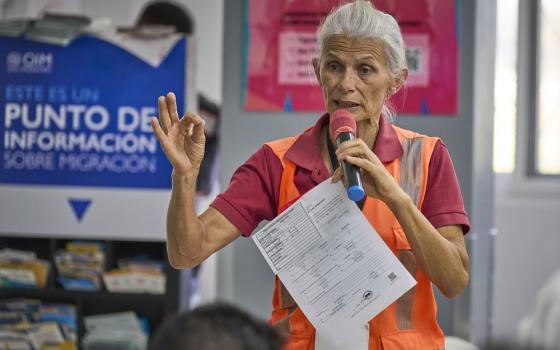Cardinal Pio Laghi, a key architect of U.S./Vatican relations who served as Pope John Paul II’s envoy to President George Bush in a last-ditch effort to stop the 2003 invasion of Iraq, has died at 86.
Laghi died in Rome Jan. 10 from a blood disorder.
Having spent a total of 17 years in the United States, Laghi always prided himself as a friend of America. His first stint came in the late 1950s as a junior Vatican diplomat, and he returned in 1980 as the pope’s top representative. Laghi used that position to push for full diplomatic relations between the Vatican and the United States – something previously seen as unthinkable on the grounds of church/state separation.
During the early 1980s, however, a meeting of the minds between President Ronald Reagan and Pope John Paul II in terms of resistance to the Soviet Union created a new climate. Full relations were created with Regan’s backing in 1984, and Laghi was named the first “nuncio,” or papal ambassador, a position he held until 1990.
Part of Laghi’s appeal to politicians was his capacity to express complicated ecclesial matters in a homespun argot, such as his explanation of what saw as the problem with liberation theology in a conversation with Reagan in the early 1980s: “Theology is like spaghetti, Mr. President,” Laghi remembered saying. “Served with too much spice, it’s bad for the digestion.”
During the Reagan years, Laghi became a close friend of George H.W. Bush – ties forged when Bush lived in the vice-presidential residence at Washington’s Naval Observatory, across the street from the home of the papal nuncio. (Laghi joked that he and Bush actually waved to one another from their respective windows.) He maintained close contacts with the Bush family even after returning to Rome.
That friendship was part of the reason John Paul II asked Laghi to carry a personal appeal in 2003, imploring the second President Bush not to invade Iraq. Though the session was cordial, Laghi later said the younger Bush clearly had his mind made up to go to war. Laghi also said that Bush seemed to take a “dualistic,” “good versus evil” view of the world – something anathema to the more nuanced spirit of Vatican diplomacy.
In a video message to a Rome conference in late December, Laghi said that events have confirmed Vatican fears of a protracted war in Iraq, including massive casualties, new ethnic and religious tensions, and greater Muslim hostility toward Christians.
Born in 1922 in Castiglione di Forli, in the Romagna region of Italy, Laghi was ordained a priest in 1946, entered the diplomatic corps in 1952, and was posted to Nicaragua. After a period in Rome, in 1969 Laghi was named the pope’s envoy to Jerusalem and Palestine, where he became a personal friend of Golda Meir.
In 1974, Laghi became the papal nuncio to Argentina during the era of that country’s military dictatorship. He became friends with several of the junta’s leaders, including Admiral Emilio Eduardo Massera, with whom Laghi reportedly played tennis almost every day. Later exposes of Argentina’s “dirty war” sometimes faulted Laghi for being overly chummy, and a few human rights groups, such as the Mothers of the Plaza de Mayo, actually accused him of complicity.
Laghi always insisted that he was simply doing his job as a diplomat of keeping lines of communication open.
“Perhaps I wasn’t a hero,” Laghi once said, “but I was no accomplice.”
Laghi’s assignment to the United States was announced in late 1980, shortly after the American elections which brought Reagan to power. Laghi recalled that his first inkling of new possibilities came in an unexpected telegram of congratulations from the president-elect, which read: “I believe we both have new jobs in Washington. Welcome!”
During his decade in the United States, Laghi not only promoted closer ties between Washington and Rome, but also put his stamp on the church in America through the appointment of a series of key bishops.
Laghi’s immediate predecessor as nuncio was Belgian Archbishop Jean Jadot. The prototypical “Jadot bishop” was usually seen as fairly liberal – Bishop Walter Sullivan of Richmond, Virginia, for example, and Archbishop Rembert Weakland of Milwaukee, both now retired. By way of contrast, the typical “Laghi bishop” was more cut from the cloth of John Paul II – prelates such as the late Cardinal John O’Connor in New York, and Cardinal Bernard Law, formerly of Boston and now the archpriest of St. Mary Major in Rome.
In 1990, John Paul made Laghi Prefect of the Congregation for Catholic Education, a job he held until his retirement in 1999. The pope named him a cardinal in 1991.
Pope Benedict XVI sent a telegram to Laghi’s nieces and nephews on Jan. 12, praising the cardinal for “long and generous service to the Holy See.” President Bush likewise offered his condolences on Jan. 11.
“Cardinal Laghi was a friend who, in his more than 60 years of service to the Catholic Church, worked tirelessly for peace and justice in our world,” a White House statement said. It said Laghi “always strove to unite people of all religions and promote reconciliation, religious freedom and tolerance.”
The Catholic News Service contributed to this report.



